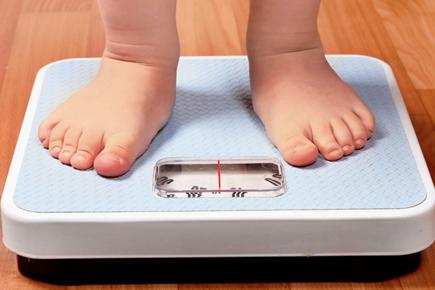Confusing your child's struggle with weight for cuteness might saddle it with disease in adult life. Here's how parents can tell the difference

![]() We live in a society that admires chubby kids. As a parent, especially as a full-time working mom, we always felt guilty about a skinny daughter, no matter how much the pediatrician assured us that she was healthy and active. On the other hand, telling a parent that their child is obese would elicit the following response: 'He looks big but he is not fat.' Or 'He looks healthy at this weight, any lower than this, he looks weak!'.
We live in a society that admires chubby kids. As a parent, especially as a full-time working mom, we always felt guilty about a skinny daughter, no matter how much the pediatrician assured us that she was healthy and active. On the other hand, telling a parent that their child is obese would elicit the following response: 'He looks big but he is not fat.' Or 'He looks healthy at this weight, any lower than this, he looks weak!'.
ADVERTISEMENT

Worldwide, obesity trends are causing serious public health concerns. Recently,the journal of Current Opinion in Endocrinology, Diabetes and Obesity had reported that excess fat that accompanies obesity might have an effect on how the bone grows. In fact, in many countries, policy makers are beginning to question the viability of basic health care delivery including weight loss businesses. Obesity-related issues among children and adolescents has now become an overwhelming concern; a fact authenticated by the statistic (check box) from the last two decades which show an increase in health care costs.
Childhood obesity affects all socio-economic groups, irrespective of age, sex or ethnicity. Dr Mandar Bichu, specialist pediatrician from Sharjah and author of the book Right Parenting: New Age Parenting and Child Health Handbook, says, "The reasons for this pandemic of obesity are same everywhere. Avoidance of breastfeeding and home-cooked weaning foods, reliance on bottle-feeding and packaged baby foods are often the first trigger factors. The typical parental fixation about 'how much does my baby/child eat' is a major culprit. Later, fast foods and more exposure to packaged processed food such as chocolates, chips, cakes, cookies and colas become a routine."
The lack of physical activity due to urban housing designs and safety concerns, and the introduction of modern technology and new gadgets are also contributing to the problem. Others believe that obesity has been encouraged by obesogenic environmental conditions especially in connection with urban lifestyles in today's day and age that tend to promote overeating.
Parent trap
"Parents want to give their kids what they did not have access to (including junk food) but they do not realise that they have also taken away the things that they had access to while growing up. For example, open playing spaces," says Dr Ekta Bhatia, physiotherapist and fitness expert, who runs Lil Munckins, a gym for children and special children in Khar. Bhatia adds that instead of keeping an eye on weight, parents and childcare givers need to check on a child's activity count. "If they lag behind in the number of activities or the enthusiasm for the activities in a day, then it is time to renew it for them by making healthy lifestyle changes and not let it lead to obesity," she says.
Obesity is the primary cause of a number of diseases, CVD (Cardio Vascular Disease) being one of them. As a therapist, Bhatia has witnessed cases in which obesity has led to bone weakness and early osteoarthritis, as well as stress fractures and fallen foot arches. The other disease on the rise is insulin resistance, leading to juvenile diabetes.
Does chubby mean fat?
So should kids be put on a diet? Will this lead to a spiraling of eating disorders? Or are we overreacting? No, suggest counsellors, doctors and therapists. Childhood obesity is a reality and the implication remains for life. Overweight children are at high risk of becoming overweight adolescents and adults, placing them at risk of developing chronic diseases including heart ailments and diabetes later in life. They are also more prone to develop stress, depression, and low self-esteem. Insulin resistance, bone deterioration, respiratory disorders are just the tip of the obesity iceberg.
Dr Shweta Rastogi, chief dietician, Guru Nanak Hospital, Bandra (E), and author of the book Eat Right to Stay Bright, says that most parents (85%) aren't able to identify the problem of obesity amongst their kids. Worse, most parents aren't even aware what their child's ideal body weight should be, "So mothers end up deciding the weight of a child by the way he/she looks."
The best person to determine whether or not your child is overweight is your child's doctor. Doctors figure this out by measuring your child's weight and height and computing the Body Mass Index (BMI) in addition to considering your child's age and growth patterns.
Weight watch
Yet when this is told, many parents tend to recoil. Bhatia recollects an incident where a parent came to her gym with her son who complained of breathlessness and leg pain. "The mother thought that the breathlessness was because the school was undergoing minor renovations and that it was triggering asthma-like symptoms," said Bhatia, adding, "Not once did it occur to the mom that her son was 18 kg over weight."
The prevention and/or early treatment interventions directed toward young children who are overweight are usually helpful. Experts suggest that if your child has been diagnosed with obesity, monitor them over six months and review the situation. Talking to kids about their weight problem and creating a supportive atmosphere at home will come as a huge relief. Most parents fear that talking about weight and focusing on food cut-downs, will mean sentencing children into eating disorders. This is not true if it is done in a healthy way.
Looking ahead
Enforcing meal regimes may not help, advises Rastogi. "A sure shot start would be to talking to your child and making them owners of their diet seems to be the only way. Head out for a family physical activity, inculcate healthy eating habits that apply for every family member, ensure that you reduce the amount of time you and your family spend doing sedentary activities, such as watching TV or playing video games," she reminds.
Childhood obesity requires a holistic approach in which awareness is created at a micro and macro level as part of community education.
 Subscribe today by clicking the link and stay updated with the latest news!" Click here!
Subscribe today by clicking the link and stay updated with the latest news!" Click here!






